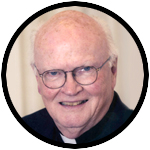
Father William Byron, S.J.
Among the many things that President Donald Trump might learn from President Abraham Lincoln is the wisdom of national forgiveness. National forgiveness is something for which we tend not to pray. Personal forgiveness is quite another story. We pray for that all the time.
But as we now look at broader, societal needs, we have to think about forgiveness writ large. Our nation should be our concern. Like ourselves individually, it stands in need of forgiveness for many faults and it is that for which we should now pray.
A proclamation for a National Day of Prayer, issued by Lincoln in 1863, read in part:
“And, insomuch as we know that by (God’s) divine law, nations, like individuals are subjected to punishments and chastisements in this world, may we not justly fear that the awful calamity of civil war which now desolates the land may be but a punishment inflicted upon us for our presumptuous sins, to the needful end of our national reformation as a whole people? …
[hotblock]
“We have grown in numbers, wealth and power as no other nation has ever grown. But we have forgotten God. … It behooves us then, to humble ourselves before the offended Power, to confess our national sins and to pray for clemency and forgiveness.”
Two years earlier, on Aug. 12, 1861, Lincoln called for a “day of humiliation, prayer and fasting for all the people of the nation.” And this, for a people “afflicted with faction and civil war,” was to be prayer “for the pardon of their past offenses and for a blessing upon their present and prospective action.”
We readily admit that nobody’s perfect, but we hesitate to admit, despite our allegiance to our country “right or wrong,” that our nation can indeed be quite imperfect, morally flawed and in need of forgiveness.
Consider the moral flaws in our nation, some supported by law and custom, others tolerated by a permissive society. Your list and mine might not be exactly the same. We will overlap here and there; there will be entries on one person’s list that do not appear on another’s.
Collectively, if we are honest and, as Lincoln would have us be, humble, in the face of national failings, we will acknowledge a national need for God’s forgiveness for our excesses, omissions and wrongful actions.
There is so much to think about when you begin to think of praying for national forgiveness.
Take an imaginative leave of your easy chair and let your inner eye rise high above the earth to look down not just on your own nation, but on the inequalities, unjust wars, hatreds, indignities, exploitations and all other moral offenses around the world.
[hotblock2]
Let the spectacle of all this move you to beg God’s forgiveness for the hardness of human heart that produces conditions like these. You are looking at the world from God’s point of view now, so feel the pain as God might feel it in the bodies and minds of those who suffer.
See the struggles on the scale that God sees them. Make an act of faith in the healing power of divine forgiveness that can bring a wounded world into balance and back to its senses.
And in considering the dimensions of the needed forgiveness, you can get a glimpse of the immeasurable dimensions of your forgiving God.
***
Jesuit Father William J. Byron is professor of business and society at St. Joseph’s University, Philadelphia. Email: wbyron@sju.edu.
PREVIOUS: Devotion needs the daily work of conversion
NEXT: Four years, and moments of grace, into a Latino papacy



Share this story